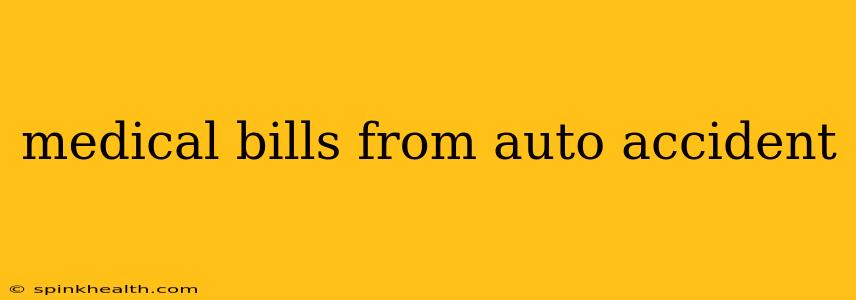The screech of tires, the crunch of metal, the jarring impact – a car accident is a traumatic experience. But the aftermath can be even more daunting, especially when faced with a mountain of medical bills. This isn't just about the cost; it's about understanding your rights, navigating the insurance process, and ensuring you receive the care you need without financial ruin. Let's unravel the complexities of medical bills stemming from an auto accident.
How are Medical Bills Handled After a Car Accident?
Imagine this: You're recovering in the hospital, still shaken from the accident, and the first thing on your mind isn't the bill – it's getting better. Thankfully, the legal system and insurance companies generally have a process in place to manage these expenses. Typically, your medical bills are initially handled by your own health insurance, if you have it. This involves submitting claims, paying co-pays and deductibles, and potentially dealing with pre-authorization requirements.
However, if the accident was someone else's fault, your medical bills become a crucial part of your personal injury claim. Your lawyer (and you should absolutely consider consulting one) will work with the at-fault driver's insurance company to negotiate payment for these expenses. This often involves detailed documentation of your injuries, treatments, and ongoing care.
What if I Don't Have Health Insurance?
This is a significant concern. Many people find themselves in a precarious position after an accident without health insurance. However, several options exist. Firstly, the at-fault driver's insurance company might still be responsible for your medical expenses, even without your health insurance coverage. This is where a strong personal injury claim becomes even more crucial. A skilled attorney can help negotiate a settlement that covers all your medical bills, regardless of your insurance status.
Secondly, some hospitals and healthcare providers offer financial assistance programs or payment plans for uninsured patients. Don't hesitate to inquire about these options, as they can make a substantial difference in managing your financial burden.
How Long Does it Take to Settle Medical Bills After a Car Accident?
There's no single answer to this question. The timeline for settling medical bills can vary significantly depending on several factors. The severity of your injuries, the complexity of the insurance claims, and the cooperation (or lack thereof) of the insurance companies all play a role. Some cases resolve quickly, while others can drag on for months or even years. Your lawyer will be instrumental in guiding you through this process and advocating for a timely resolution.
What Types of Medical Bills Are Covered After a Car Accident?
This is broader than you might think! It's not just hospital stays and doctor's visits. Your medical bills might encompass:
- Emergency room visits: The initial treatment you received.
- Hospital stays: Including surgery, medication, and rehabilitation.
- Doctor visits: Follow-up appointments with specialists.
- Physical therapy: Rehabilitative care to aid your recovery.
- Chiropractic care: Treatment for musculoskeletal injuries.
- Medication: Prescriptions to manage pain and other symptoms.
- Medical equipment: Such as crutches, wheelchairs, or braces.
- Future medical care: If you have long-term injuries requiring ongoing treatment.
How Do I Negotiate Medical Bills After a Car Accident?
Negotiating medical bills can be complex. Your lawyer will typically handle these negotiations on your behalf. They possess the experience and knowledge to effectively communicate with insurance adjusters, argue for fair compensation, and protect your interests. However, if you're handling the matter yourself, remember to be polite but firm. Document every communication, including emails and phone calls, and be prepared to provide supporting evidence for all your medical expenses.
What if the Insurance Company Won't Pay My Medical Bills?
If the insurance company refuses to pay your medical bills despite a clear liability, it's crucial to take immediate action. This is where a lawyer becomes indispensable. They can explore legal options, such as filing a lawsuit, to compel the insurance company to fulfill its obligations. Don't hesitate to seek legal advice; your financial well-being depends on it.
Navigating the aftermath of a car accident is challenging, but understanding how medical bills are handled can significantly alleviate some of the stress. Remember, you're not alone in this process. Seek professional guidance from a qualified attorney and healthcare professionals to ensure you receive the care and compensation you deserve.

